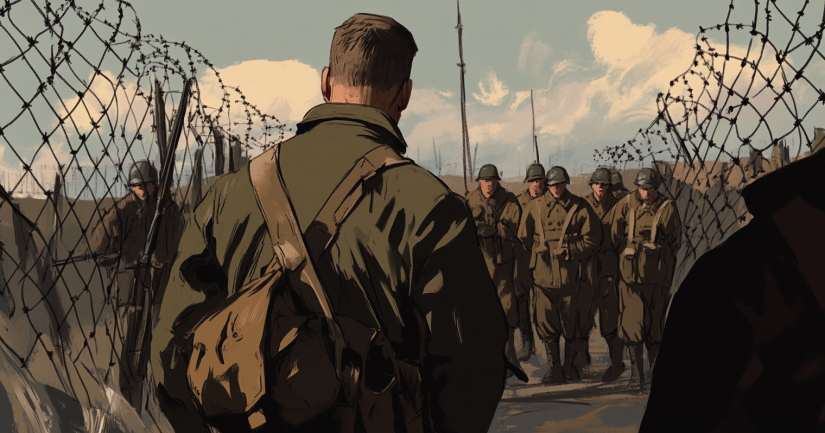
All Quiet On The Western Front Chapter 8 Quiz awaits to challenge your knowledge of this riveting chapter. This is your chance to dive deep into the world of Erich Maria Remarque’s powerful novel. Here, you will explore the raw emotions and vivid imagery that define this chapter. As you journey through the questions, you’ll uncover the profound themes of camaraderie, survival, and the harsh realities of war.
In Chapter 8, our protagonist, Paul Bäumer, faces the stark contrast between life at the front and the world beyond. You will examine how Remarque paints this picture with his evocative language. Each question will challenge you to think critically about the characters’ struggles and the novel’s poignant messages.
The war continues, but Paul’s perspective is shifting. What does this mean for his future? Continue reading in All Quiet On The Western Front Chapter 9. If you want to revisit his time away from the front lines, check out All Quiet On The Western Front Chapter 7. And if you’re looking for the ultimate test of your memory, take the All Quiet On The Western Front Full Book Quiz.
This quiz will not only test your knowledge but also enrich your understanding of the novel’s depth. As you reflect on the text, you’ll gain insights into the human spirit’s resilience amidst chaos. So, prepare to engage with the text on a deeper level. Let’s embark on this literary journey together and see how well you grasp the essence of Chapter 8. All Quiet on the Western Front Quizzes: Think you know Paul Bäumer’s journey?
What Happened – All Quiet On The Western Front Chapter 8
In Chapter 8 of All Quiet on the Western Front, Paul Bäumer visits a training camp. The camp is near a Russian prisoner-of-war camp. Paul observes the Russian prisoners. They are weak and starving. The prisoners rummage through the garbage looking for food. Paul feels sorry for them. He notices they are just like him and his friends.
Paul’s father and sister come to visit him. They bring him food. Paul shares his food with the Russian prisoners. He gives them cigarettes too. Paul watches the Russian prisoners play music and dance. He realizes they are not much different from him.
Paul’s father talks about his mother’s illness. She is in the hospital. They discuss her health and the cost of treatment. Paul worries about his mother. His father wants to know about the war. Paul does not want to talk about it.
The soldiers at the camp treat the Russian prisoners poorly. The prisoners are often beaten. Paul feels bad for them. He believes they are ordinary people caught in the war. Paul reflects on how war affects everyone.
Paul helps guard the Russian prisoners. He continues to share his food with them. Paul feels a connection with the prisoners. He thinks about how they are all human. Paul hopes the war will end soon.
All Quiet On The Western Front Chapter 8 – Quotes
- “I’m frightened. I dare think this way no more.” – Paul Bäumer, ‘Reflecting on the impact of war on his psyche and the loss of hope.’
“It is strange to think that at home in the drawer of my writing table there lies the beginning of a play.” – Paul Bäumer, ‘Recalling his pre-war aspirations and the stark contrast to his current reality.’
“I stand up and look round me, and then I know for the first time that I am in France.” – Paul Bäumer, ‘Realizing his disconnection from the world and his environment during the war.’
“We are not youth any longer.” – Paul Bäumer, ‘Acknowledging the loss of innocence and youth due to the war’s harsh experiences.’
“This is the front, now we are within its embrace.” – Paul Bäumer, ‘Describing the inescapable, consuming nature of the battlefield.’
All Quiet On The Western Front Chapter 8 – FAQ
Chapter 8 is primarily set in a training camp near the front lines. This location is in close proximity to a Russian prisoner-of-war camp, allowing the protagonist, Paul Bäumer, to observe the prisoners and reflect on their condition.
Initially, Paul views the Russian prisoners with a sense of detachment. However, as he spends more time near them, he begins to see their humanity and realizes they are much like himself—ordinary men caught in the horrors of war. This shift underscores the shared suffering and loss experienced by soldiers on all sides.
Chapter 8 delves into themes of empathy and the futility of war. Paul’s interactions with the Russian prisoners highlight the arbitrary nature of enemy lines and the inherent kinship between all soldiers. This chapter also questions the dehumanizing effects of war and the moral complexities faced by those involved.
Remarque uses the Russian prisoners as a symbol of the universal suffering caused by war. Their plight represents the broader tragedy of the conflict, emphasizing the shared humanity that transcends national boundaries. Additionally, their dire conditions serve as a stark contrast to the more comfortable lives led by those away from the front lines.
Chapter 8 is pivotal in deepening Paul’s disillusionment with the war. His growing empathy for the Russian prisoners challenges his previous understanding of enemies and allies, further isolating him from the nationalist fervor that initially drove him to enlist. This chapter marks a significant step in his journey toward questioning the purpose and morality of the conflict.
